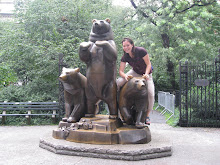So, I just finished reading David Silver's article "Looking Backwards, Looking Forward: Cyberculture Studies 1990-2000" (http://www.scribd.com/doc/9525177/Silver?secret_password=2kj8wcye7gt62iokofhh). It basically gave a very brief overview on the evolution of ethnographic/cultural research that has taken place in the 90s to 2000. Read with Neil Whitehead's more contemporary piece, it is interesting to see the threads evolving and continuing betwixt the works.
In terms of gender relations, it is interesting that both Silver and Whitehead mention the freedom that cyberspace allows women (no physical fear/boundaries/body image). Silver mentions a woman who learned to accept a recent limb amputation through creating a one-legged RPG character and entering into a cyber relationship whereas Whitehead explicitly mentions sex/sexuality without danger of rape or "toxic" relations. It also is interesting that Silver's article and Whitehead's both mark the internet as being predominantly male.
Speaking solely on Silver's article and the brief history of cyberculture research it gave, I wonder how applicable it is to the modern internet. He mentions Howard Rheingold's work on community building in the internet, Sherry Turkle's study of identity, and several other scholars' works on gender issues, feminism, identity, etc. but there seems to be a distinct lack of information/research mentioned concerning violence, abusive language, or anything remotely like "trolling". I wonder if the internet was too nascent for the researchers to have noticed this phenomenon, or if perhaps the author merely looked at the more 'positive' aspects and had not read much on the negative side...
The most valuable thing (the MVT, if you will), that I gleaned from this article is a sense of what has already been studied. What kinds of topics can I expect to find at least preliminary research and what topics have been covered thoroughly, but perhaps are worthy of having new research-life breathed into them due to the evolution of cyberspace. I seem to be gravitating towards the creation of identity anonymously and then what people choose to do with their anonymity... Sherry Turkle has already written an entire book on the topic of cyber identity and I know that others have covered it as well, but the article was excellent in giving a broad overview of what people studied in the internet's first decade as a truly public-accessed communication medium.
I feel like I should go find Turkle's book and at least skim parts of it as well as to search for more research on identity, anonymity, et al. because now I know that someone has already laid the foundation and created the groundwork to make this project both academically valid and publicly appealing...
oi.
Subscribe to:
Post Comments (Atom)

No comments:
Post a Comment